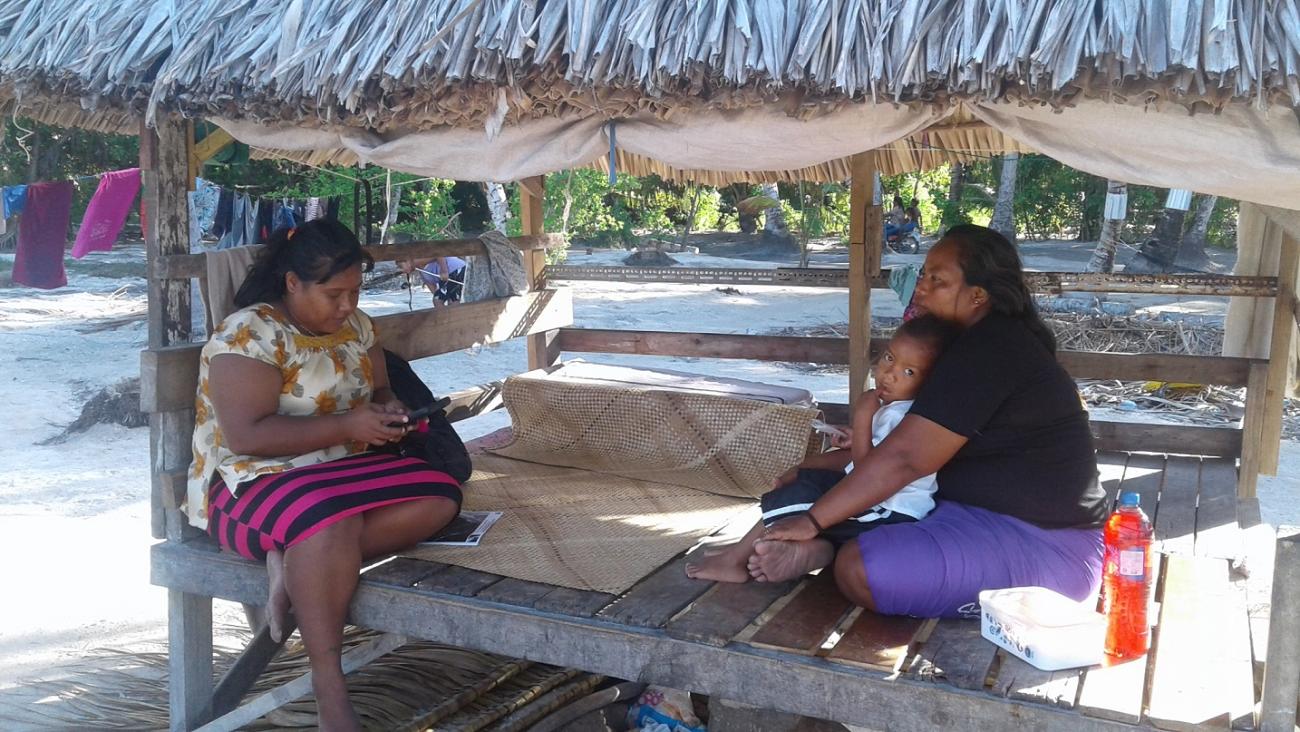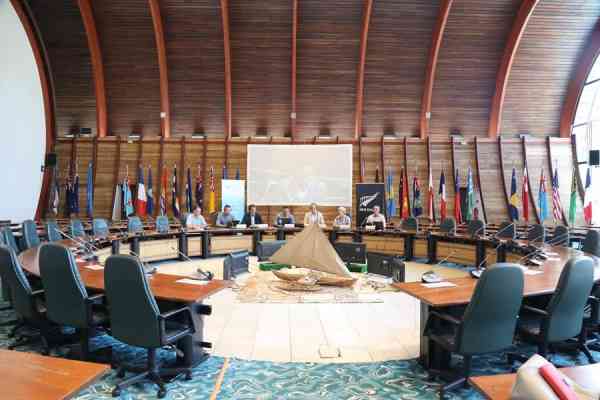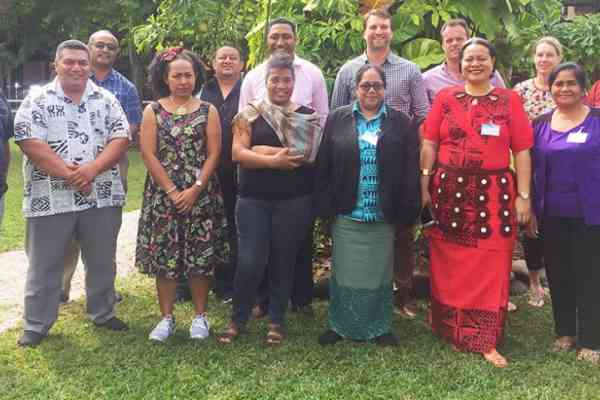Crédits photo : CPS/Toga Raikoti
(contenu disponible en anglais uniquement)
When University of Arizona political economy professor, William Mishler needed Kiribati census and household income data for a project he was working on with Millennium Challenge Corporation (MCC) he turned to the Pacific Data Hub (PDH) to access the microdata he needed.
The PDH is a central repository of data about the Pacific and from the Pacific. It is a collection of different data platforms and tools and a programme of work that encourages data sharing and access for increased transparency and evidence-based decision and policy making across the region.
The Pacific Data Hub – Microdata Library is one aspect of the PDH where microdata is preserved, cataloged and documented.
’Microdata’ refers to data that contain information about people, that has been anonymised but otherwise retains the detailed individual responses to the original survey, to reduce the risk of respondents being identified.
In the past, microdata from the Pacific has been difficult to access. Traditionally there has been a conservative approach to the release of microdata in the region however, through the PDH’s work this is changing and a broad acceptance of the value of microdata for research, transparency and accountability is growing.
Central to this are government statisticians who oversee access to country microdata. It was thanks to Aritita Tekaieti, Republic Statistician in Kiribati, who saw the value in the request and released the microdata that enabled William to access the information he needed.
“Finding so much data on this small island country accessible in a single place and so well documented has been an unexpected treasure”, said William when we caught up with him to discuss his work and the role data plays in it.
Thanks for your time William, can you tell us a bit about your background and work?
My academic research traditionally has been focused on citizen participation and representation in the policy process as part of a more general concern with promoting democracy and democratization.
Virtually all my work over the years relies heavily on rigorous statistical analyses of survey research, which, when done well, is one of the best ways to understand public opinion and one of the best, as well, to give voice to otherwise voiceless people. I see public opinion surveys as fundamental tools for democracy. Indeed, I was co-founder and director for the better part of two decades of the New Democracy Barometer, a bi-annual survey conducted in ten Central and Eastern European Countries during the early years of their post-communist economic and political transitions. I also was co-director of the New Russia Barometer tracking public opinion in Russia from 1991 through 2012.
Parallel to my academic work, I have worked for many years as a consultant to a variety of Non-Profits working with USAID and, more recently, to the Millennium Challenge Corporation on projects promoting both democracy and economic development. It is my work with MCC on promoting productive employment in Kiribati that has prompted my interest with data on Pacific Island Countries in general and Kiribati in particular.
What role does data play in the work that you do?
MCC, and specifically the Gender and Social Inclusion Team at MCC, for whom I work directly, are committed to using data driven research to identify the constraints to private investment and entrepreneurship that are the most binding on inclusive economic growth in the country. In addition to macro-economic data on the economy of the countries in which MCC works, we also rely heavily on survey research and other individual-level data to help us understand how macro-economic forces impact individuals and sub-groups in society, especially those who are economically most at risk and traditionally have been marginalized and neglected.
In Kiribati, surveys not only allow us to assess the economic situations confronted by women and youth, but they also enable assessments of the economic and social forces affecting different islands and villages.
What are some of the challenges you’ve encountered in accessing data on the Pacific?
Being new to research on PICT countries, I, personally, have been pleasantly surprised by how much survey data is available for Kiribati and other Pacific countries. Our work to date in Kiribati has used a variety of surveys including both the 2010, 2015 and preliminary 2020 Census data, but also the 2006 and 2019 Household Income and Expenditure Surveys (including the Village Resources Module of the 2019 HIES), the 2018-2019 Social Development Indicator Survey (MICS6), and the Transparency International 2021 Pacific Global Corruption Barometer.
There have been relatively few challenges to accessing these data. The Kiribati National Statistics Office and the Pacific Data Hub have been extremely generous in providing access to the data they have collected or archived. The data portals are well organized and well documented. The steps for gaining permission to access the data are clear and easy to follow. And the approval process has been fast and uniformly positive. Even data listed as “unavailable” has been made available.
The only limitation to the data that MCC has encountered is the difficulty experienced, in some data sets, of identifying respondent’s islands and villages. These have been anonymized in some surveys for the very good reason of protecting the identities of respondents who might otherwise be easily be identified in small islands and villages by virtual of a respondent’s age, family size, and position, etc. This limitation, however, has proved of minimum importance, however, since most analysis are focused on Island Groups and not specific islands other than South Tarawa, which is easily to identify from contextual data.
How are you using the Pacific Data Hub in your work?
MCC is using Pacific Hub data in combination with data from the World Bank, ILO, and other sources for a variety of purposes. First, the MCC country team for Kiribati is large and diverse, but few of its members have spent any substantial time in country or had any detailed knowledge about the country’s economy or society before starting this project. Moreover, the current international pandemic has made travel to Kiribati all but impossible. Pacific Data Hub data thus provided many of us our first opportunity to become familiar with the country, to “meet” its citizens, and to begin to understand the parameters of daily life on the islands.
Second, the data have allowed us to undertake a variety of more focused analyses of economic life on the islands: who is employed or in in search of employment, in what occupations, with what income and benefits. What limits productive employment for women and youth as well as men? How does household production, fit into the economic situation? How much do households rely on overseas remittances including international labor migration.
Third, the data are being used to test a variety of hypotheses generated by our conversations with Kiribati government officials, NGO leaders, and other Donor groups regarding the root causes of the constraints to private investment and entrepreneurship that have been identified in the country. All of this is intended to ensure that any programs MCC develops in cooperation with the Kiribati government is based on the best possible data we can assemble.
The Pacific Data Hub (PDH), is a central repository of data about the Pacific and from the Pacific. The platform serves as a gateway to the most comprehensive collection of data and information about the Pacific across key areas including population statistics, fisheries science, climate change adaptation, disaster risk reduction and resilience, public health surveillance, conservation of plant genetic resources for food security and human rights.


